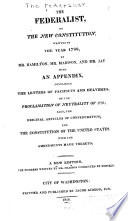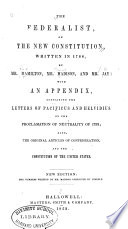 When the legislative and executive powers are united in the same person or body," says he, " there can be no liberty, because apprehensions may arise lest the same monarch or senate should enact tyrannical laws, to execute them in a tyrannical manner. When the legislative and executive powers are united in the same person or body," says he, " there can be no liberty, because apprehensions may arise lest the same monarch or senate should enact tyrannical laws, to execute them in a tyrannical manner.  The War Power After 200 Years: Congress and the President at a ... - Page 707by United States. Congress. Senate. Committee on Foreign Relations. Special Subcommittee on War Powers - 1989 - 1428 pagesFull view The War Power After 200 Years: Congress and the President at a ... - Page 707by United States. Congress. Senate. Committee on Foreign Relations. Special Subcommittee on War Powers - 1989 - 1428 pagesFull view - About this book
 | William Cobbett - Great Britain - 1808 - 534 pages
...the two powers of making the v,Want* executing the law should never meet. Montesquieu declares that " when the legislative and executive powers are united in *• the same person, o> in the same body of " magistrates, tit: re can be no liberty." * But he afterwards mmnt.iins, not... | |
 | Great Britain - 1810 - 538 pages
...government be so constituted " as that one man be not afraid of another. " But," says Montesquieu, " when the " legislative and executive powers are "united in the same person, or in'the " same body of magistrates, there can be " no Liberty'; because apprehensions " may arise,"... | |
 | Alexander Hamilton, James Madison, John Jay - Constitutional history - 1817 - 570 pages
...department. The reasons on which Montesquieu grounds his maxim, are & further demonstration of his meaning. " When the legislative " and executive powers are united in the same person or body,'' says he, " there can be no liberty, because apprehensions may " arise lest the same monarch... | |
 | James Madison, John Jay - Constitutional law - 1818 - 882 pages
...department. The reasons on which Montesquieu grounds his maxim, are a further demonstration of his meaning. " When " the legislative and executive powers are united in the " same person or body," says he, " there can be no " liberty, because apprehensions may arise lest the same tl monarch... | |
 | William Paley - Ethics - 1835 - 324 pages
...this principle generally acceded to 1 And the following reasons for it are given by Montesquieu : " When the legislative and executive powers are united in the same person or body, there can be no liberty ; because apprehensions may arise lest the same monarch or senate should... | |
 | Alexander Hamilton, James Madison, John Jay - Constitutional history - 1837 - 516 pages
...department. The reasons on which Montesquieu grounds his maxim, are a further demonstration of his meaning. " When the legislative " and executive powers are united in the same person or body," says he, "there can be no liberty, because apprehensions may " arise lest the same monarch or... | |
 | Arkansas. Supreme Court - Law reports, digests, etc - 1876 - 650 pages
...extent of this maxim, and the reason by which it is supported is, according to Montesquieu, that " when the legislative and executive powers are united in the same person, or the same body of magistrates, there can be no liberty, because apprehensions may arise lest the monarch... | |
 | Alexander Hamilton, James Madison, John Jay - Constitutional law - 1852 - 528 pages
...department. The reasons on which Montesquieu grounds his maxim, are a further demonstration of his meaning. " When the legislative and " executive powers are united in the same person or body," says he, " there can be no liberty, because apprehensions may arise lest " the same monarch... | |
 | George Bowyer - Jurisprudence - 1854 - 424 pages
..." The reasons on which Montesquieu grounds his maxim are a further demonstration of his meaning. 1 When the legislative and executive powers are united in the same person or body,' says he, 1 there can be no liberty, because apprehension may arise lest the same monarch or... | |
 | Civilization - 1861 - 686 pages
...the rights of nations ; the Executive, in affairs which relate to civil right. There is no liberty if the legislative and executive powers are united in the same person or body of persons, because the same monarch or senate may make tyrannical laws in order to execute them... | |
| |